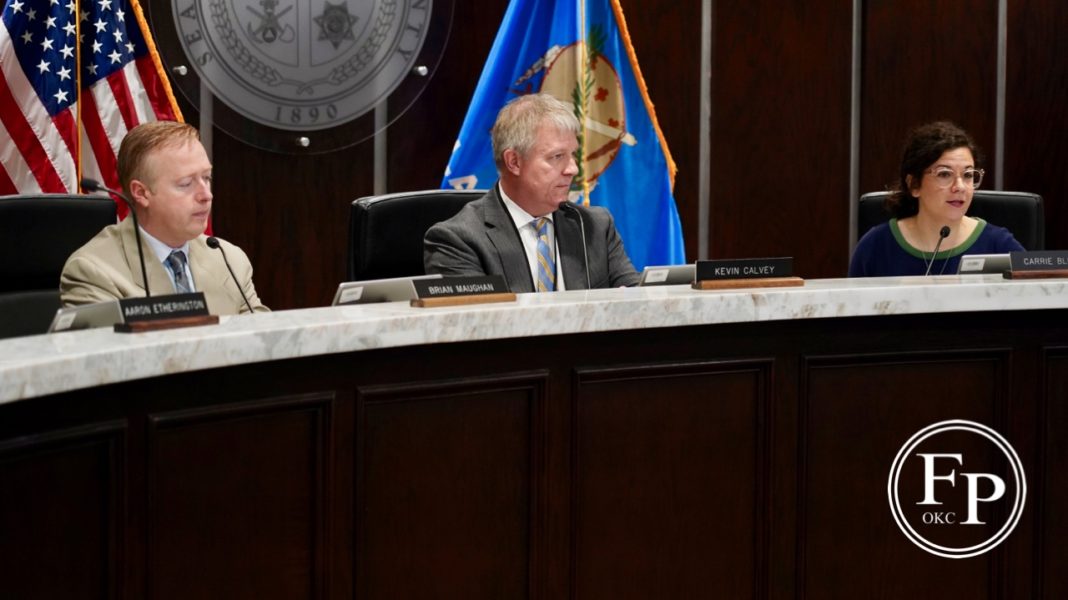Last Updated on March 19, 2020, 9:34 PM | Published: March 19, 2020
The Oklahoma County Budget Board and Board of County Commissioners met on Thursday to discuss regular business and the entirely irregular business of Covid-19 responses.
Commissioners took up state-of-emergency situations such as how to grant medical and family leave, how to move more people to remote working for now, what it means to have teleconferencing of meetings and still have open meetings to the public, and how to limit courthouse visits from the public without restricting Constitutional access of the public to legal proceedings.
Today’s meeting was well-attended, better attended than one Commissioner preferred. At ten minutes into the Budget Board meeting, District Three County Commissioner and Chair of the Board Kevin Calvey implored everyone in attendance who didn’t need to be present to leave. A number of people left the room at that point to watch the live-stream from their offices.
Family Leave
An item carried over from Monday’s Special Meeting introduced by District 1 Commissioner Carrie Blumert came on again for hearing and Blumert requested that the item be stricken in light of a new emergency law signed by the President.
The new law expands the Family Medical Leave Act, essentially rendering moot the employee handbook amendment recommended by the Handbook Committee. The County has fifteen days from signing of the new law to implement it as policy, making the deadline April 2. The law allows for emergency leave for persons who contract the virus or who have household members who have contracted the virus. In many cases this leave will pay only an amount of their daily salary not to exceed $200 per day.
District 2 Commissioner Brian Maughan and County Treasurer Butch Freeman wanted to make sure that employees knew which kind of leave they might be using and what they were getting into financially if they did.
Remote Work
Calvey took the opportunity again to implore all departments to send home any and all employees who could work from home. He underscored that it was their duty and responsibility to only spend those tax dollars on actual work for people working from home, giving the example that if a road crew employee had to work from home they should spend that time watching training videos or engaged in similar activities.
County Clerk David B. Hooten reported that the County is nearly ready to move to teleconferencing for meetings like this, but said that there is still testing that needs to be done, as well as finding a logistical solution for inclusion of public participation.
Hooten also took the opportunity to encourage the public to use the Clerk’s virtual office instead of visiting in person, though the office will remain open for the time being.
On that note, Calvey stated that the Annex Building was about 95% empty and said it needed to be even emptier. “We may all get sick, but we need to make sure we don’t all get sick at once and overwhelm medical services. It’s all of our responsibilities.”
When the Budget Board concluded their regular meeting, the Board of County Commissioners returned to their Special Meeting that recessed on Monday afternoon. Calvey had two new items to introduce.
Open Meetings
First, the County needed a resolution to adopt the new Senate Bill 661. The new bill, signed yesterday by Governor Stitt, relaxes some of the stipulations of the Open Meetings Act. Public notice of meetings is not required under the state of emergency, and teleconferencing is now allowed for public meetings.
Calvey pointed out that while Notice was no longer required, he believed they should carry on the practice. The complication for the Board members came in the consideration of public comment and participation. They all agreed that while the public should be able to watch meetings, it may become necessary to suspend public comments during meetings if the meetings move to a teleconference model.
All three Commissioners stated that they didn’t want public comment to go away forever. Calvey pointed out that, while public comment is not required by law, it is an important part of tradition for these County meetings.
Essentially, public comment during teleconferencing is a matter of technology that simply isn’t available. The software to be used for teleconferencing can have up to 1,000 invitees. To otherwise open the meeting to be commented upon by any viewer opens the meeting to possible commentary from tens of thousands of people if not more.
The Board ultimately chose to suspend public comment, but to include a centralized email address in a notice of the meetings. Members of the public are welcomed to email questions and comments about agenda items or general comments. The emails will be collected by the Clerk’s office and presented to the Board during meetings.
Courthouse Restrictions
A second new item from Calvey was a resolution to restrict access to the County Courthouse during the state of emergency. Yesterday Tulsa County approved a resolution in almost every detail similar.
After reading a draft of the resolution, Calvey called for the first of several recesses of the long meeting so that Commissioners and their staffs could review the resolution.
When they reconvened, Blumert requested an amendment to include the Courthouse Annex in the restriction. Calvey agreed that it was good to be specific in this way.
Maughan asked why limit the restriction to those buildings and not all county buildings, specifically Social Services locations and the Juvenile Detention Center.
A representative of the DA’s office gave commentary on his qualms about the resolution.
Columnist covering local government in Oklahoma City and Oklahoma County from May 2019 through June 2023.









